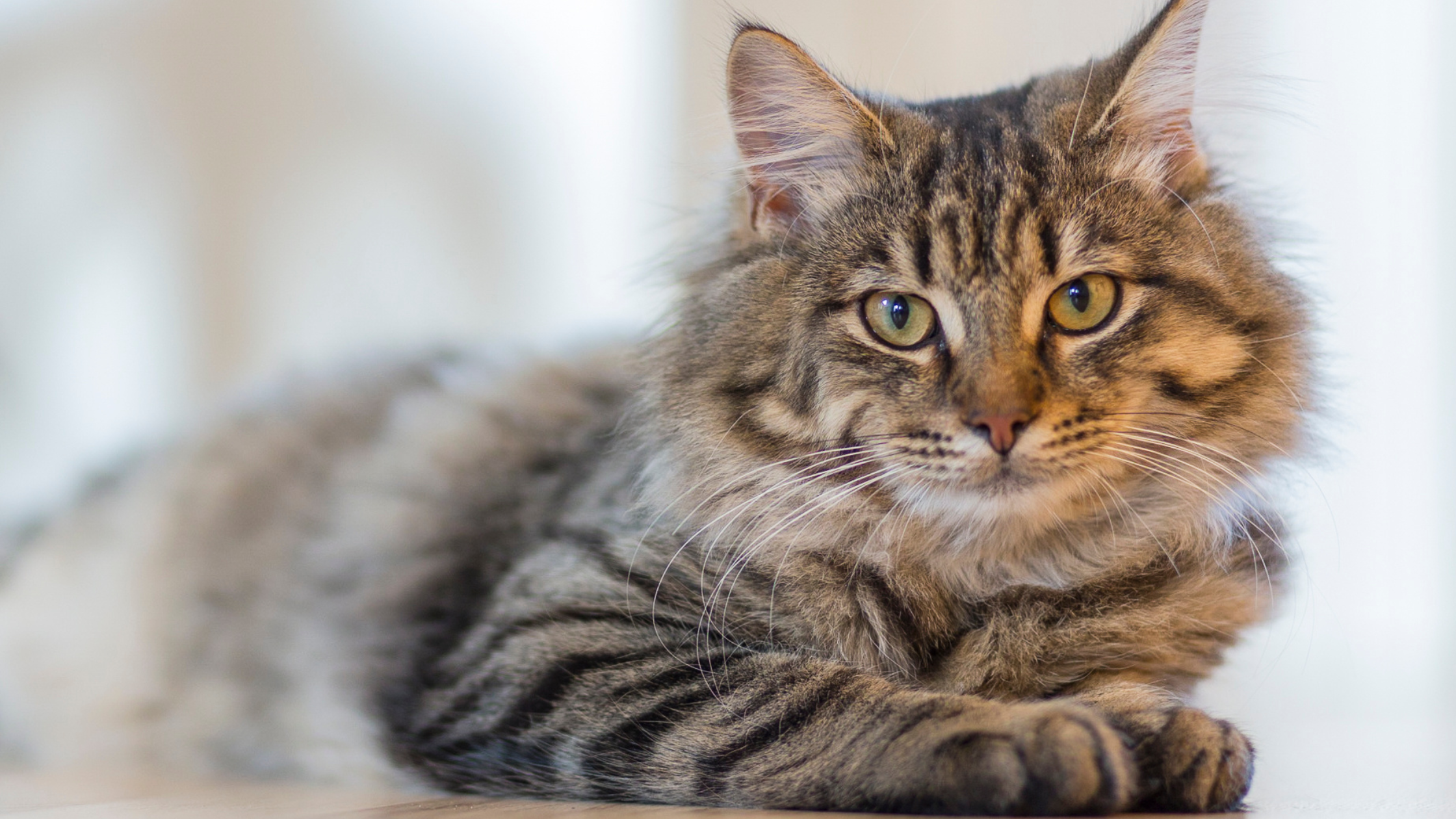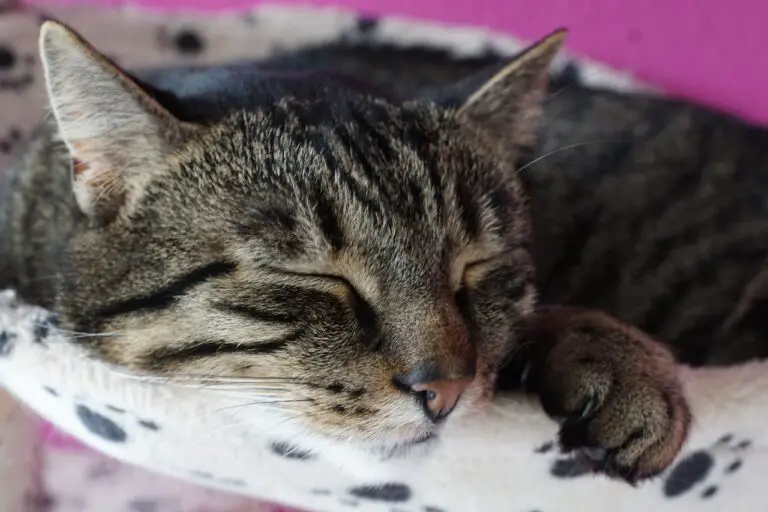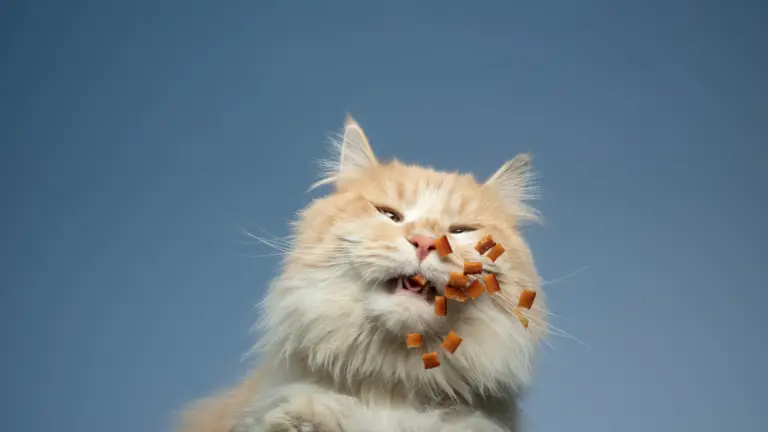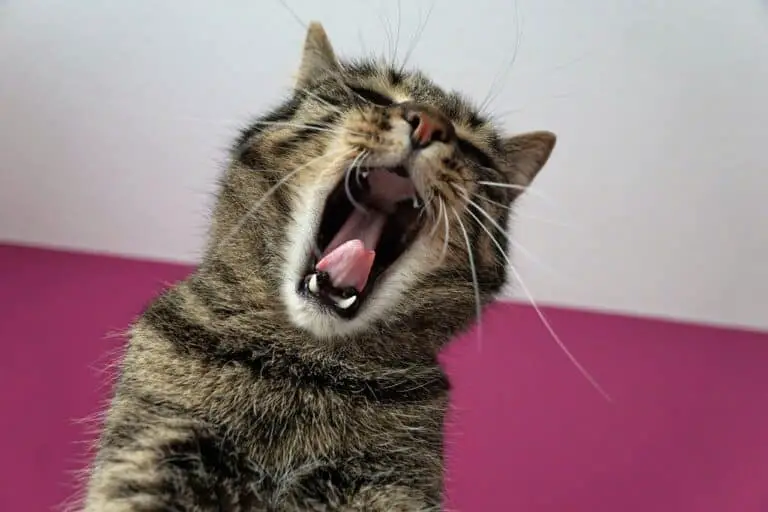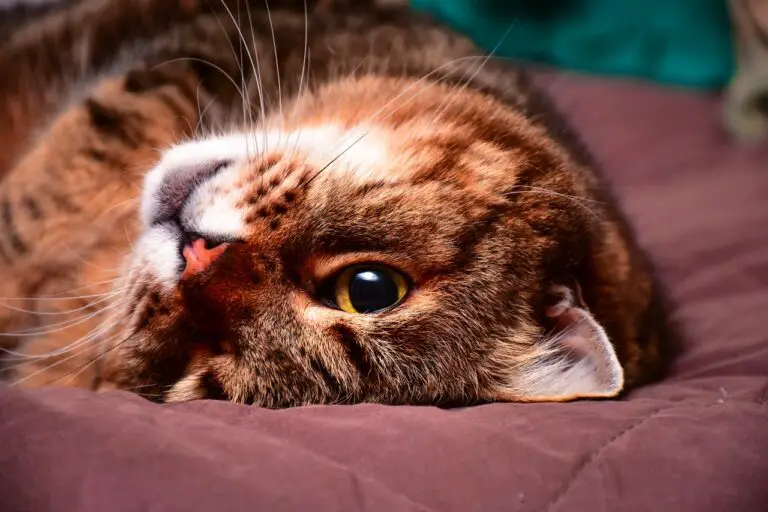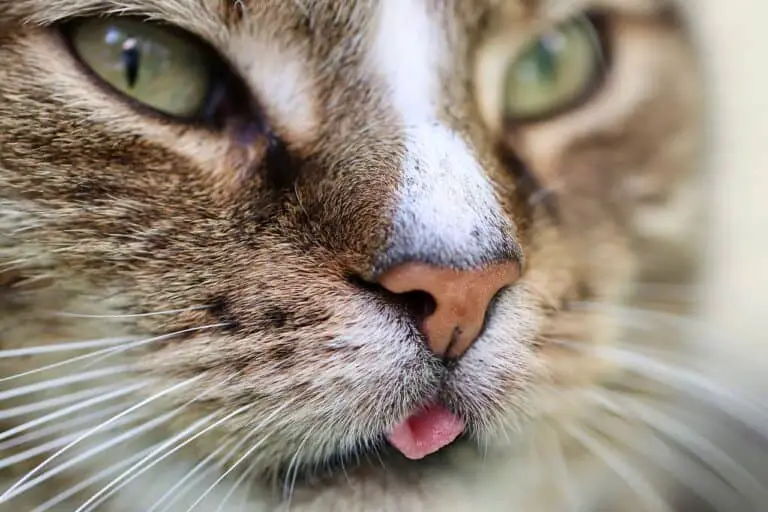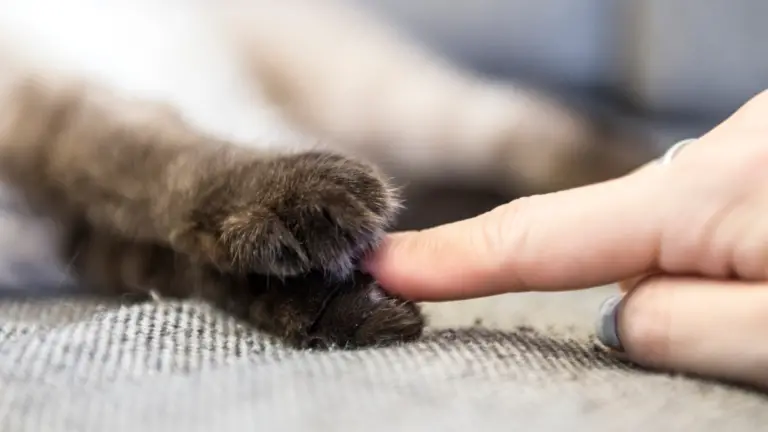MY CAT IS SO SKINNY I CAN FEEL THE BONES [WHEN TO BE WORRIED?]
My cat is so skinny I can feel the bones. Is there something wrong? If a cat is too skinny, the chances are that he is underweight. The causes can be many.
If your cat feels so skinny that the bones can be easily felt, it’s possible that your cat is underweight, and there may be an underlying health issue causing it. This can happen as cats age or can be a sign of severe conditions, especially in sudden weight loss.
![MY CAT IS SO SKINNY I CAN FEEL THE BONES [WHEN TO BE WORRIED?]](https://dorkycats.com/wp-content/uploads/2023/02/Copy-of-Copy-of-Copy-of-4-FREE-PIN-TEMPLATES-2020-700x1500-13-512x1024.png)
WHEN CAN A CAT BE CONSIDERED UNDERWEIGHT?
If my cat is so skinny I can feel the bones, I first ask myself if he is underweight.
Generally, a cat is considered underweight when its body condition score (BCS) is below a score of 5 on a 9-point scale.
The BCS measures the amount of fat and muscle a cat has, taking into account the visibility of its bones and the overall appearance of its body. A score of 5 indicates that a cat has an average amount of fat and muscle, and a score below 5 indicates that the cat is underweight.
It is important to note that the BCS can be subjective and can vary between veterinarians. Therefore, it is best to consult a veterinarian to determine your cat’s BCS and to determine if it is underweight.
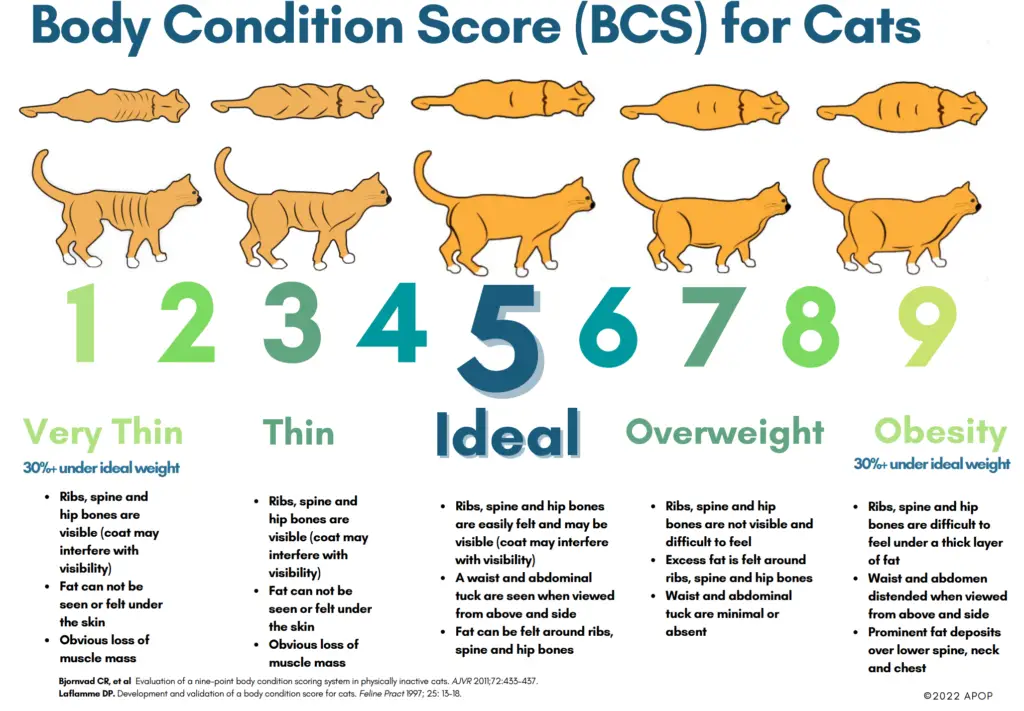
If your cat is underweight, the veterinarian will work with you to develop a plan to help your cat achieve a healthy weight.
This may involve
- Changes to the cat’s diet
- Exercise routine
- Medical treatment for any underlying health issues
HOW CAN I DETERMINE IF MY CAT IS OVERWEIGHT WITHOUT USING THE BCS MEASURES?
If you don’t have access to a veterinarian to perform a body condition score (BCS), you can assess your cat’s weight by using the “rib test.”
To do this, you can place your hands on your cat’s ribcage, with your thumbs on the spine and your fingers on the sides of the chest.
A healthy cat should have a slight layer of fat over its ribcage, and you should be able to feel its ribs without having to press hard. If you can quickly feel your cat’s ribs and the bones are prominent, it is likely that your cat is underweight.
Additionally, you can look at your cat from above and observe if its waist is visible and if the area just below the ribcage sinks in. A healthy cat should have a slight waist, and the area below the ribcage should not sink in.
Remember that these assessments are not as precise as a BCS measurement by a veterinarian, but they can give you a rough idea of your cat’s weight.
If you are concerned about your cat’s weight, it’s always best to consult a veterinarian for a more accurate evaluation and appropriate treatment.
CAN A CAT BE SKINNY WITHOUT HAVING HEALTH PROBLEMS?
Some cats can have a naturally slender build and be skinny without having health problems. However, noticeable rib and hip bones or a noticeable waist are still indicators that a cat is underweight and may be cause for concern.
It is essential to consult a veterinarian to determine if your cat’s weight is within a healthy range and to rule out any underlying health issues.
If the veterinarian determines that your cat is healthy, they may still recommend dietary changes or increased exercise to help maintain a healthy weight.
Regular weight checks and monitoring of your cat’s body condition score can also help ensure that your cat stays healthy and at a healthy weight.
MY CAT IS SO SKINNY I CAN FEEL THE BONES – WHY?
The main concern when a cat is too skinny is the presence of sudden weight lost. A vet must most likely intervene if a cat loses weight too fast. But there are other things to consider.
There can be several reasons why a cat is getting skinny:
- Illness: Many health problems, such as infections, kidney disease, or thyroid issues, can cause a cat to lose weight.
- Dental problems: Cats in pain from dental problems may not eat enough, leading to weight loss.
- Changes in diet: Sudden changes in a cat’s diet or a lack of access to food can cause weight loss.
- Aging: As cats age, their metabolism can slow down, leading to weight loss.
- Parasites: Intestinal parasites can interfere with a cat’s ability to absorb nutrients, leading to weight loss.
To maintain a healthy weight, it is essential for cats to have an appropriate balance of caloric intake and energy expenditure. Therefore, it is essential to consult a veterinarian to determine the cause of your cat’s weight loss and to develop a plan to help your cat achieve a healthy weight.
The veterinarian will thoroughly examine and recommend any necessary tests to determine the cause of your cat’s weight loss.
CAN A CERTAIN TYPE OF DIET MAKE A CAT LOSE WEIGHT?
Specific diets can be the cause of a cat losing weight. If you have changed your cat’s diet recently or the type of food, your cat might experience a change in weight.
Here are some examples of a cat diet behind a cat’s weight loss or a diet formulated to help a cat to lose weight:
1. HIGH PROTEIN AND LOW CARBOHYDRATE DIETS
These diets are designed to mimic the natural diet of cats, which is high in protein and low in carbohydrates. As a result, they can help increase a cat’s feeling of fullness and reduce overall calorie intake, leading to weight loss.
2. PRESCRIPTION DIETS
Some veterinary clinics carry prescription diets that are specifically formulated for weight loss in cats. These diets are lower in calories and fat than standard diets and often contain ingredients that help increase a cat’s feeling of fullness.
3. HOMEMADE DIETS
With the guidance of a veterinarian, a cat owner can prepare a homemade diet that is lower in calories and tailored to their cat’s specific needs.
It’s essential to consult a veterinarian before making any changes to a cat’s diet, as weight loss should always be made under the guidance of a professional.
Additionally, cats that are losing weight should be monitored closely to ensure that they are not losing weight too quickly or becoming malnourished.
MY CAT IS SKINNY BUT EATS. SHOULD I BE WORRIED?
![MY CAT IS SO SKINNY I CAN FEEL THE BONES [WHEN TO BE WORRIED?]](https://dorkycats.com/wp-content/uploads/2023/02/Blogging-Tips-LinkedIn-Post-Header-43-1024x576.png)
If your cat is skinny but eats well, it may still be an issue of concern. An underlying medical condition, such as digestive problems or parasites, could prevent your cat from adequately absorbing nutrients.
In some cases, your cat can be skinny but not underweight. In this case, if there is no sudden weight change or other signs of illness, your cat may have a skinny body frame. To be sure, bringing your cat to the vet is better.
Additionally, certain medical conditions can cause a cat to have a higher metabolism, leading to rapid weight loss despite eating an average amount of food. Therefore, it is best to consult a veterinarian for a thorough examination to determine the cause of your cat’s weight loss.
WHY IS MY CAT THIN AT THE BACK END?
A thin cat at the back end could indicate an underlying health problem. Some possible causes of weight loss in this area include:
- Anal sac problems: Inflammation or infection of the anal sacs can cause pain and affect a cat’s appetite.
- Gastrointestinal issues: Diseases such as inflammatory bowel disease or parasites such as tapeworms can affect a cat’s digestion and cause weight loss.
- Orthopedic problems: Arthritis, spinal problems, or hip dysplasia can cause pain and mobility issues in cats, leading to weight loss.
- Kidney disease: Chronic kidney disease can cause a cat to lose muscle mass and weight.
It is essential to consult a veterinarian for a proper diagnosis and treatment plan. They can determine the specific cause of your cat’s weight loss and recommend the best course of action.
I CAN FEEL MY CAT HIP BONES. IS THAT NORMAL?
If you can quickly feel your cat’s hip bones, it may signify that your cat is underweight. While some cats naturally have a more slender build and can be thin, noticeable rib and hip bones can indicate that a cat is too thin.
It is essential to consult a veterinarian to determine the cause of the weight loss and to develop a plan to help your cat achieve a healthy weight.
Possible causes of weight loss in cats include illness, parasites, dental problems, and changes in diet or activity level.
IS MY CAT TOO SKINNY IF I CAN FEEL HER SPINE?
If you can feel your cat’s spine easily, it is likely that she is underweight. Cats should have a layer of fat over their spine, ribs, and hips, so if you can feel these bones (with no layer of fat), it is a sign that your cat is too thin.
This can cause concern, as it can indicate an underlying health issue, such as an illness, parasite infection, or an inadequate diet.
HOW CAN I FATTEN UP MY SKINNY CAT?
If you have ruled out medical issues about your can skinny figure or weight loss, then you can try to make your cat gain some weight in various ways.
There are several steps you can take to help fatten it up:
1. VISIT THE VET
Before making any changes to your cat’s diet, it’s essential to rule out any underlying health problems that may be causing weight loss.
2. INCREASE CALORIES INTAKE
If your cat is underweight, it needs to consume more calories to gain weight. You can do this by switching to a higher-calorie diet or by increasing the portion size of your current diet.
3. FEED YOUR CAT MORE FREQUENTLY
Feeding your cat smaller, more frequent meals throughout the day can help increase its calorie intake and promote weight gain.
4. HIGH-CALORIE TREATS
Offer your cat high-calorie treats, such as canned tuna or chicken, to increase its calorie intake.
5. PROVIDE PLENTY OF FRESH WATER
Make sure your cat has access to plenty of fresh water at all times to help it stay hydrated.
WILL TUNA HELP MY CAT GAIN WEIGHT?
![MY CAT IS SO SKINNY I CAN FEEL THE BONES [WHEN TO BE WORRIED?]](https://dorkycats.com/wp-content/uploads/2023/02/Blogging-Tips-LinkedIn-Post-Header-44-1024x576.png)
Tuna can be a high-calorie treat that can help your cat gain weight if it is consumed in moderation. However, feeding your cat a diet primarily made up of tuna is not recommended, as it can lead to malnutrition.
Cats are obligate carnivores and require a diet that is high in animal protein and low in carbohydrates. Feeding your cat a diet made up mostly of tuna could result in a lack of essential nutrients, including vitamins and minerals.
Additionally, some types of tuna, such as canned tuna, can contain high levels of mercury, which can be toxic to cats.
DOES CHICKEN FATTEN UP CATS?
Chicken can be a good source of protein and calories for cats, and feeding it in moderate amounts as a treat or supplement to a balanced diet can help a cat gain weight.
However, cats are obligate carnivores and require a diet primarily made up of animal protein with a balanced amount of essential fatty acids and vitamins. Feeding your cat a diet made up mostly of chicken or any other food item can result in a lack of essential nutrients, leading to malnutrition and other health problems.
WILL RICE HELP CATS TO GAIN WEIGHT?
Rice is a carbohydrate-rich food that can provide some calories to cats, but it is not a complete or balanced source of nutrition for them. Cats are obligate carnivores and require a diet that is high in animal protein and low in carbohydrates.
Feeding your cat a diet made up mostly of rice can result in a lack of essential nutrients, including vitamins and minerals, leading to malnutrition and other health problems. Additionally, some cats may have trouble digesting rice, leading to digestive issues such as bloating, diarrhea, and vomiting.
HOW MUCH SHOULD A CANT EAT A DAY TO GAIN WEIGHT?
The amount of food a cat should eat daily to gain weight depends on several factors, such as age, activity level, and underlying health conditions.
A general guideline is to feed a cat about 20 to 30 calories per pound of body weight per day, so they should eat more than that to gain some weight. However, this is just a general guideline, and the exact amount can vary based on your cat’s individual needs.
Weight gain should occur gradually and not too quickly, as rapid weight gain can strain a cat’s organs and joints.
WHAT FOODS STIMULATE CATS APPETITES?
If you want your cat to eat more, you can also provide some cat-friendly food to stimulate their desire to eat.
There are several foods that can stimulate a cat’s appetite:
- Tuna: Cats love the taste of tuna, and it can be a great way to entice a picky eater to eat.
- Chicken: Chicken is an excellent source of protein and can be a good way to get your cat to eat when they are feeling picky.
- Warm water: Warming up a cat’s food to just above room temperature can make it more appealing and increase its appetite.
- Wet food: Wet food has a stronger aroma and flavor than dry food, which can stimulate a cat’s appetite.
- Fish-based food: Many cats love the taste of fish, and fish-based food can be an excellent way to get them to eat when they are feeling picky.
- Smelly food: Some cats prefer food that has a strong aroma, such as sardines or anchovies.
- Home-cooked food: Cooking up a simple meal for your cat, such as boiled chicken and rice, can be an excellent way to get them to eat when they feel picky.
It’s important to remember that while these foods can stimulate a cat’s appetite, they should not be used as a long-term solution for a picky eater.
If your cat is consistently not eating, it’s best to consult with a veterinarian to determine if there is an underlying health issue causing the lack of appetite.
FREQUENTLY ASKED QUESTIONS
Will milk help a cat gain weight?
Milk can be a source of additional calories for cats, but it’s not recommended as a primary source of nutrition for adult cats. This is because many adult cats are lactose intolerant, which means they cannot digest lactose, the sugar found in milk. This can lead to digestive problems such as bloating, diarrhea, and vomiting.
Should a cat feel bony?
A cat should not feel excessively bony. If you can feel the bones in your cat, it’s a sign that they are underweight and may need to gain some weight.
In a healthy cat, a slight layer of fat should cover the bones, and you should not be able to feel their spine, ribs, or hip bones easily.
How long does it take an underweight cat to gain weight?
The length of time it takes for an underweight cat to gain weight will depend on several factors, including their age, overall health, and the underlying cause of their weight loss.
Generally, a healthy cat should be able to gain about 1/2 to 1 pound per month. However, if a cat is severely underweight or has an underlying health issue, it may take longer for them to gain weight and reach a healthy weight.

